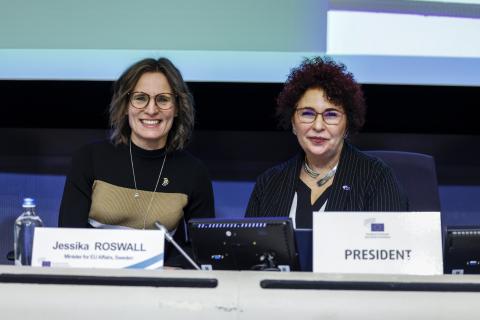European Economic
and Social Committee
2023 Swedish Council presidency: Ukraine still top of the agenda
The January plenary session of the European Economic and Social Committee (EESC) featured a debate during which the Swedish Minister for EU Affairs, Jessika Roswall, presented the priorities of the new presidency of the Council of the European Union.
Guaranteeing security for EU citizens and upholding the principle of the rule of law and fundamental rights: crisis management measures will be the main priorities for Sweden, which will hold the presidency of the Council of the European Union from January to June 2023.
During a plenary debate on 25 January 2023, EESC president Christa Schweng pledged the Committee's full support for the presidency: This is an incredibly challenging time to take over the presidency, as the EU is experiencing a harrowing war at its borders. The EESC welcomes these priorities in the context of the Russian aggression against Ukraine, as we must not let our security or our values be affected. We stand by Ukraine.
Jessika Roswall, Swedish Minister for EU Affairs, said that the Swedish presidency considered that close cooperation with other EU institutions and bodies, including the EESC, was paramount and looked forward to staying in close contact and maintaining an open dialogue.
Mentioning the presidency's top priority, she stressed that Sweden is taking up the presidency at a time of historic challenges for the Union. Russia's brutal war of aggression against Ukraine will continue to dominate the European agenda
.
The Swedish presidency will work to uphold European unity and make the Union greener, safer and freer, focusing on:
- Security
- Competitiveness
- Green and energy transitions
- Democratic values and the rule of law.
Stefano Mallia, president of the EESC's Employers Group, also focused on competitiveness, saying that a competitiveness agenda was the perfect recipe for recovery and resilience: businesses are vital for the economy but need the right conditions to operate.
Oliver Röpke, president of the EESC's Workers Group, praised the Swedish model as a demonstration of the other facets of competitiveness, such as strong social dialogue, social partner involvement and robust social policies.
However, all this cannot happen without meaningful cooperation with EU organised civil society, pointed out Séamus Boland, president of the EESC's Civil Society Organisations Group. He emphasised the importance of ensuring effective participation and delivering on the conclusions of the Conference on the Future of Europe.
Downloads
-
2023 Swedish Council presidency: Ukraine still top of the agenda
